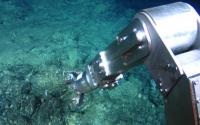Rare Earth Elements

Quicktabs: Keywords

Insatiable demand for minerals and rare earth elements, coupled with dwindling resources on land have stakeholders across the world looking to a new frontier: the deep sea.
[ More ]
Minerals, such as rare earth metals, are increasingly becoming an important commodity in a resource-constrained world economy. As a result new frontiers both onshore and offshore, to the depths of the ocean, are emerging around the world.
[ More ]
Japan keeps finding treasure in deep-sea mud. For the second time in two years, a Japanese team has announced vast deposits of rare earth elements on the floor of the Pacific Ocean.
[ More ]
David Cameron has pledged to put Britain at the forefront of a new international seabed mining industry, which he claimed could be worth £40bn to the UK economy over the next 30 years. But the prime minister has chosen an American defence company – Lockheed Martin – to spearhead the drive to collect from the depths of the ocean the copper, nickel and rare earth minerals used in mobile phones and solar panels.
[ More ]
In the past 12 months, the geopolitics of rare earths has become evident. REMs are becoming a strategic resource over which the two emerging giants are competing in Asia. Indeed, one might say rare earths are fast becoming “the next oil.”
[ More ]
Life in the 21st century wouldn’t be the same without rare earth metals. Cell phones, iPads, laptops, televisions, hybrid cars, wind turbines, solar cells and many more products depend on rare earth metals to function. Will there be enough for us to continue our high-tech lifestyle and transition to a renewable energy economy? Do we need to turn to deep seabed or asteroid mining to meet future demand?
[ More ]
India has joined the race to explore and develop deep-sea mining for rare earth elements — further complicating the geopolitics surrounding untapped sources of valuable minerals beneath the oceans.
[ More ]
The author argues that if the U.S. wants to increase its access to Rare Earth Elements make domestic mining a more attractive investment then the Senate should ratify the Law of the Sea Treaty.
[ More ]
China is using government funds to stockpile rare earth minerals amid concerns its reserves are running low, a state newspaper has reported. According to the China Securities Journal the stockpiling is already well underway, and most likely began a while before the country published a white paper on 20 June announcing the extent of its dwindling supplies and suggesting it would build a strategic reserve.
[ More ]
Last week, the EU, US and Japan formally asked the World Trade Organisation (WTO) to look at China’s export restriction on rare earth metals. Lawyers believe the case will run and run.
[ More ]Pages
The United States needs to invest in off-shore drilling for its national defense: "The U.S. requires an incredible number of military products for which rare earth minerals [which are found in abundance in the seabed] are essential.”116The Case for Ratification of the Law of the Sea Treaty — Andrew Langer. — Real Clear Politics — Nov 28, 2012 [ More ] In the past, military products were manufactured in the United States.117The Case for Ratification of the Law of the Sea Treaty — Andrew Langer. — Real Clear Politics — Nov 28, 2012 [ More ] Today, a "tremendous number of our bullets are manufactured in China ... meaning that if we find ourselves cross-wise with the Chinese, they can cut off our supply of bullets.118The Case for Ratification of the Law of the Sea Treaty — Andrew Langer. — Real Clear Politics — Nov 28, 2012 [ More ] It is a matter of national security that the United States be self-reliant on ammunition for its weapons."119The Case for Ratification of the Law of the Sea Treaty — Andrew Langer. — Real Clear Politics — Nov 28, 2012 [ More ] The United States needs to accede to UNCLOS to give companies the security to invest in offshore drilling, in order to be able to manufacture bullets independently from its own supply of rare minerals.120The Case for Ratification of the Law of the Sea Treaty — Andrew Langer. — Real Clear Politics — Nov 28, 2012 [ More ]
Advances in deep sea resource exploration and exploitation technologies have also given rise to the prospect of accessing seabed resources not only within areas of outer continental shelf but in deeper waters and areas beyond national jurisdiction. While developments in the area are proceeding apace, notably in respect of the Clarion-Clipperton Zone in the Equatorial North Pacific Ocean and in the Central Indian Basin of the Indian Ocean,n areas of outer continental shelf subject to national jurisdiction are likely to be particularly attractive areas for development from the perspective of the coastal states, which hold sovereign rights over these areas. Indeed, it has been estimated that the Clarion-Clipperton Zone alone holds more than 27 billion tonnes of nodules containing of the order of 7 billion tonnes of manganese, 340 million tonnes of nickel, 290 million tonnes of copper and 78 million tonnes of cobalt as well as rare earths needed for the production of many hi-tech products such as smart phones.78 This led the International Seabed Authority's (ISA) Legal Counsel, Michael Lodge, to comment in May 2013 that "We are on the threshold of a new era of deep seabed mining."79 While the figures suggested may appear extraordinary, there seems little doubt that interest in the exploitation of these resources will be sustained so long as commodity prices remain high. The ISA's approval of exploration plans for the development of cobalt-rich manganese crusts by Chinese and Japanese concerns during its nineteenth session in July 2013 also appears to bear out the seriousness of this interest.80
